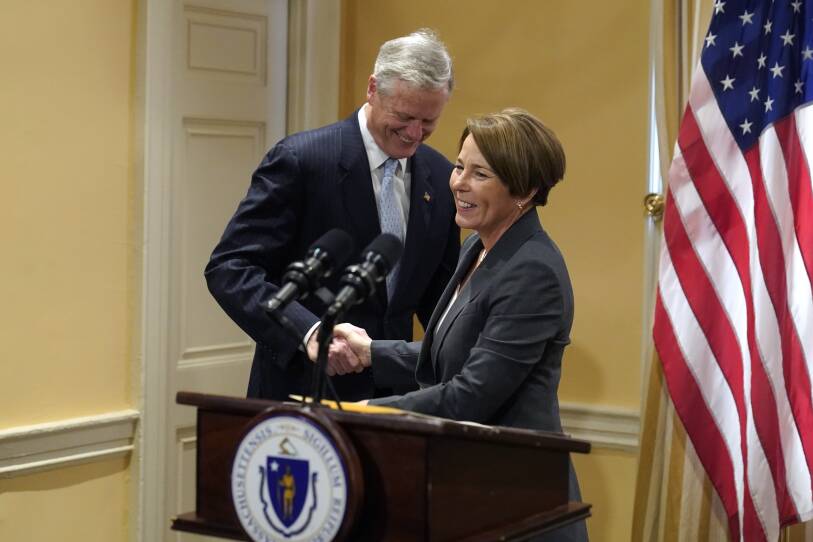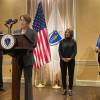Updated at 3:01 p.m. Dec. 16
The big question of what outgoing Gov. Charlie Baker’s next move would be now has an answer. The National Collegiate Athletic Association announced Thursday that Baker will serve as its next president starting in March.
Baker, who played varsity basketball at Harvard, will take the reins from the current NCAA president Mark Emmert. The NCAA, the organization that regulates college athletics and organizes events like the March Madness basketball tournament, said Baker stood out in a national search because of his history of "forging bipartisan solutions to complex problems."
Baker appears to be in line for a significant pay boost. The NCAA’s tax forms show Emmert earned a salary of more than $2.8 million in the fiscal year ending August 2020. As governor, Baker currently earns an annual salary of $185,000.
"I am honored to become the next president of the NCAA, an organization that impacts millions of families and countless communities across this country every day," Baker said in a statement. "The NCAA is confronting complex and significant challenges, but I am excited to get to work as the awesome opportunity college athletics provides to so many students is more than worth the challenge."
"And for the fans that faithfully fill stadiums, stands and gyms from coast to coast, I am eager to ensure the competitions we all love to follow are there for generations to come," Baker continued. "Over the coming months, I will begin working with student-athletes and NCAA members as we modernize college sports to suit today's world, while preserving its essential value."
Baker lacks formal experience working within the college sports world, but the NCAA noted his family has deep ties to it. In addition to Baker’s time playing hoops at Harvard, his wife, Lauren, was a college gymnast and two of their three kids were college athletes.
At a time when the NCAA says it wants to work with policymakers to replace a state-by-state patchwork of laws regulating college sports with a national framework, Baker will come in with established relationships with other governors, members of Congress and federal officials.
Baker said the search committee approached him a couple months ago, and the job wasn’t on his mind when he announced last year that he would not run for a third term as governor.
“I wasn’t really spending a lot of time thinking about what I was gonna do after I left office,” he said on an NCAA press call. “I was focused on, as I’ve said, running through the tape.”
As governor, Baker had advocated to legalize sports betting in Massachusetts, and he signed a bill in August to do so. The sports betting law here allows for wagering on some college sports — it prohibits bets on Massachusetts teams, unless they’re participating in a tournament like the NCAA’s March Madness.
Former college athletes are well represented in the Massachusetts political ecosystem.
Baker’s successor, Gov.-elect Maura Healey, also played basketball at Harvard.
“I know he knows the important role athletics can play and I’m excited for the future of college sports and student-athletes under his leadership,” Healey said in a statement.

Holy Cross sports economist Victor Matheson was shocked by the news of Baker's new role.
"My initial reaction is for someone who's retiring from the governorship and passed up a chance to run for Senate, at least in part because he wanted to take a little break from politics, this is an awfully funny way to take a break from politics," said Matheson, who was part of an economist group that wrote an amicus brief on behalf of college athletes in National Collegiate Athletic Association v. Alston, the U.S. Supreme Court case that found NCAA rules limiting certain education-related benefits for athletes were against anitrust laws.
Baker will be facing a sea of challenges and changes, from mega conferences at the highest levels of college athletics consolidating power among the richest schools to the ever-evolving topic of player compensation and the NCAA's own fading power.
Matheson said there are two big issues facing the NCAA. The first is its fight to uphold amateurism.
"At what point are they going to completely give up the ghost on amateurism and realize that it's going to continue to be even more and more and more difficult to have a situation where schools aren't directly paying top athletes in men's football, in men's basketball and occasionally other sports besides that?" he said.
The other issue, Matheson said, is whether the crown jewel of the NCAA, March Madness, can be held together going forward, pointing out how important the redistribution of money from that tournament is to athletic programs across the country.
"You're going to see more and more push by the Power 5 conferences1 to have more of their teams in there, fewer of the Holy Crosses, fewer of the University of Vermonts, more of the Dukes, more of the Kenutckys," he said. "And again, how are you going to split up that money? Are you gonna split up that money so that the conferences that do very well in the tournament, do they get even more of the proceeds out of it? Or is it gonna stay like today where the NCAA ... basically takes a bunch of men's basketball money and lavishes it on every single Divison I program — from men's swimming at Holy Cross and women's soccer at Harvard — and it doesn't all go back to the Kentucky and Louisville basketball programs."
Matheson said he's also interested to see how the NCAA will promote sports besides men's basketball.
"I think for the last five decades, probably, they have underlooked what is a pretty, potentially, profitable stream of revenue that they could get from women's volleyball and women's soccer and women's basketball that they've kind of been overlooking," he said.
Ryan Bamford, the athletic director at UMass, was pleasantly surprised by the announcement. He said Baker has shown he has the skills needed to be a successful NCAA president. Those will be crucial, because, as he says, the NCAA has been under a microscope, at least at the Division I level.
"I think all of the ability that Gov. Baker had in the private sector at [Harvard Pilgrim Health Care], the work that he did politically even before he became governor ... he's got experiences and skills that he's developed that are going to allow him to do the good work that we need to get us pushed forward and in a space where people can understand what the next 25 years of our national association will be," Bamford said.
Mary-Beth Cooper, president of Springfield College and a member of the seven-person NCAA search committee, wouldn't say exactly how many candidates there were for the job, but she did call the pool numerous and "quite diverese." Cooper said there were a number of factors that made Baker stand out.
"I think his success as a bipartisan leader. The amount of things he was able to accomplish in office. His favorability in terms of being a Republican in a blue state was certainly compelling," she said. "He's a person that gets things done. And he was able to demonstrate that in his interviews and impressed upon the committee that he was the right leader at the right time for the NCAA."
Cooper said that one of Baker's biggest skills is listening. That's something she believes will be crucial for him as president, a role she told Baker will be very complex.
"Unless you're doing that job and unless you're working in the NCAA, you might have an opinion about what the NCAA is doing or not doing," she said. "But I think for him to go in and understand the dynamics between the divisions and the current staff and where we need to go to protect college sports...and we need to move rather quickly. It's not urgent, but there are a lot of things happening around college sports and a lot of people commenting on it. And so it's gonna need leadership and it's gonna need leadership quick."
This is a developing story. Check back for updates.
GBH News' Esteban Bustillos contributed to this story.
1Power Five is a term used to describe the five biggest conferences in college football, which include the Atlantic Coast Conference, which Boston College is a member of, the Big Ten, the Big 12, the Pac-12 and the Southeastern Conference.









